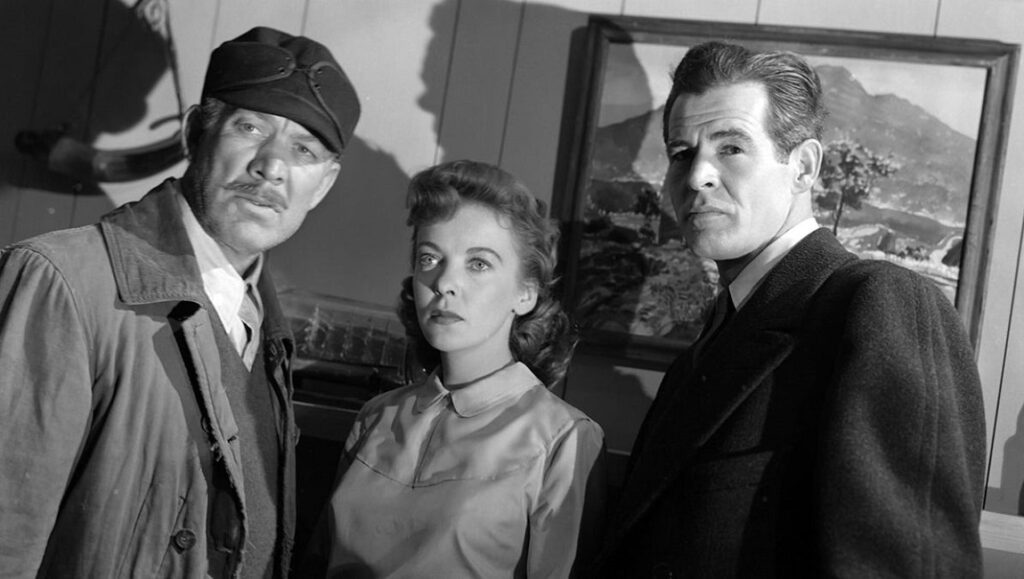“This boy… and this girl… were never properly introduced to the world we live in.” So begins the dramatic voice-over of Nicholas Ray’s debut feature, They Live By Night (1948). It’s an apt motto for virtually all of Ray’s oeuvre, one filled to the brim with neurotic romantics that find themselves violently butting up against an uncaring world. Ray dabbled in many genres — he will forever be linked to classic melodrama and James Dean’s mystique thanks to Rebel Without a Cause, of course — but he also found conflicted, desperately emotional protagonists in the western (Run For Cover; Johnny Guitar; True Story of Jesse James), crime-adjacent pictures (Party Girl; In a Lonely Place; Born to Be Bad), war movies (Flying Leathernecks; Bitter Victory), and gigantic Hollywood spectacles (King of Kings; 55 Days at Peking). This specter of haunting existential malaise infects even sui generis projects like Wind Across the Everglades, The Savage Innocents, and The Lusty Men. The ideal Ray character is an outsider, uncomfortable not only in polite society but also in their own skin.
Dean’s famous “you’re tearing me apart!” — simultaneously bellowed and whimpered at his doltish parents — finds its genesis in Robert Ryan’s unstable cop in On Dangerous Ground (1951). Ryan plays Detective Jim Wilson, an impossibly sensitive man crumbling under the weight of performing aggressive masculinity, his anger metastasized into violence. He’s a loner, his spartan existence prefiguring the hollowed-out men of so many of Paul Schrader’s films. Wilson and his partners have been tasked with rounding up suspects in a cop killing. The first half of On Dangerous Ground functions largely as a procedural, with Wilson prowling the city’s underworld trying to get a lead on a possible culprit. Everyone he meets is a crook or a whore, playing an angle or offering a bribe. Ray shoots these early scenes like a waking nightmare, everything enveloped in a noirish darkness. Much like the jittery helicopter shots he pioneered in They Live By Night, Ray uses shaky handheld cameras as a kind of subjective synecdoche for Wilson’s unstable psyche. One scene finds him chasing a man down an alleyway that becomes increasingly expressionistic as the men descend further and further into the bowels of the city, the walls receding forever into the background like a never ending maze. Once Wilson collars his man, he proceeds to beat a confession out of him, almost in tears as he repeatedly screams “why do you make me do it?” to the bloodied victim. It’s a harrowing moment, as Ryan is both dangerously unhinged and impossibly vulnerable. Like so many of Ray’s troubled men, Wilson doesn’t understand, nor can he contain, his own impulses.
After the victim files a complaint, Wilson’s boss sends him away until the heat dies down. His new assignment: assisting in a murder investigation upstate. Here the film switches from the dense urban milieu of its first half to something starker, more barren. The small town is in the middle of nowhere, surrounded by snow-covered fields and wide open spaces. It’s a jarring juxtaposition, although each reflect Wilson’s fractured psyche in different ways. A young girl has been killed, and her father, Walter (played by Ford regular Ward Bond), is demanding vigilante justice. Wilson prefers to investigate, and winds up meeting Mary (Ida Lupino), a blind woman who lives alone. Wilson is immediately disarmed by Mary’s grace, and Ryan and Lupino’s scenes together are some of the most tender moments Ray ever filmed. Dave Kehr makes mention of the film’s “ethereal romanticism” in his original Chicago Reader blurb, going on to say “Ray excels… in his exalted vision of the snow-covered countryside, filmed as a blindingly white, painfully silent field for moral regeneration.” Once Wilson discovers that the killer is Mary’s mentally unstable younger brother, Danny, the film hinges on his promise to bring the boy to justice while also keeping Walter from killing him. It’s a moral conundrum, which ultimately plays out amidst the rocky terrain of the landscape (like so many Ray films, the terrain here feels like an active participant in the story, alternately beautiful and deadly). Wilson can’t save Danny, but he does his best to keep his promise to Mary. It’s a small victory, but one that might very well save his soul. Jacques Rivette once wrote that Ray was “concerned with the interior demon of violence, which seems linked to man and his solitude.” Wilson ends On Dangerous Ground no longer alone, which might very well be the only kind of happy ending that Ray can envision.
Part of Kicking the Canon – The Film Canon.


Comments are closed.